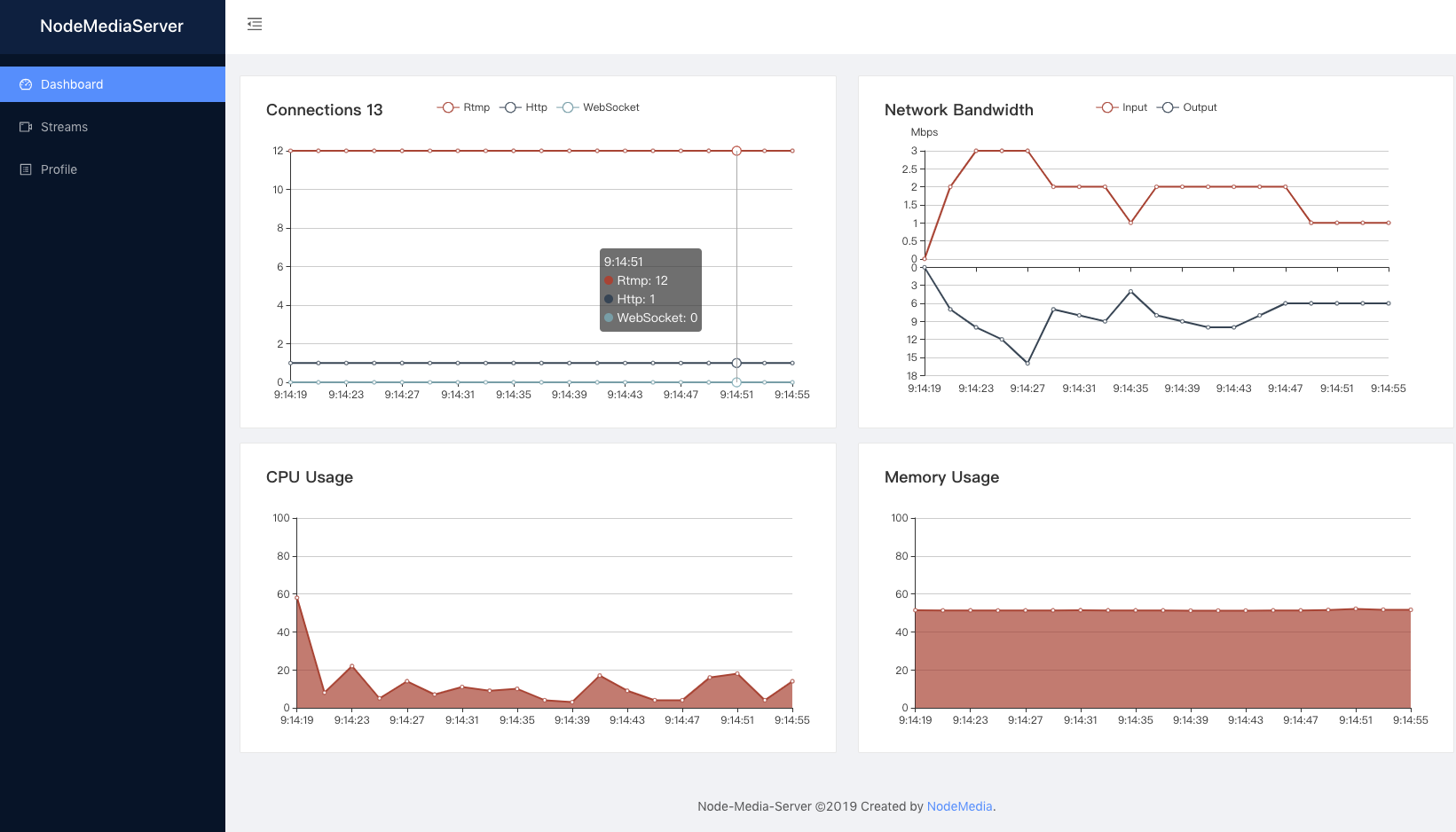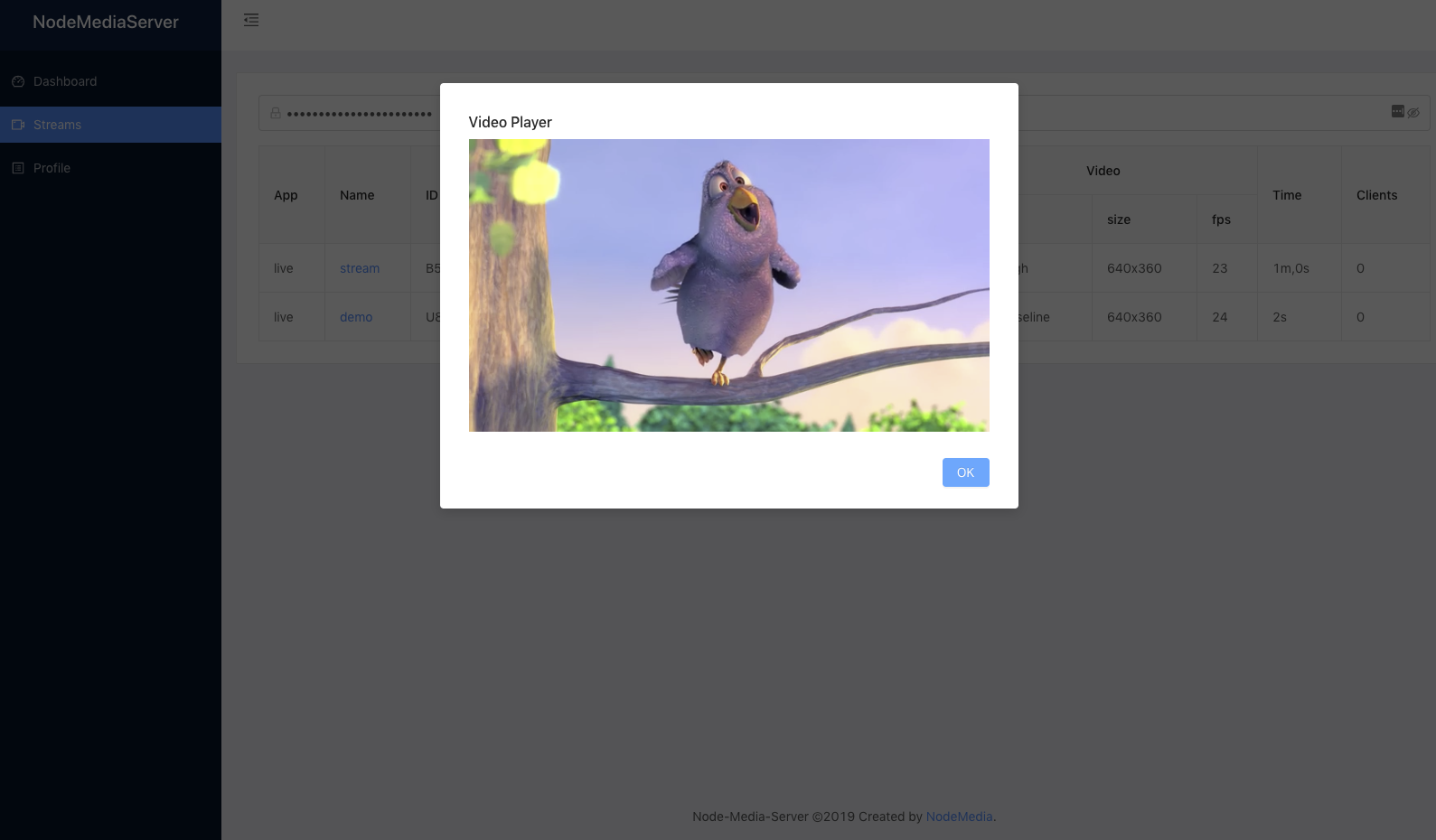A Node.js implementation of RTMP/HTTP-FLV/WS-FLV/HLS/DASH Media Server
中文介绍
If you like this project you can support me.
- Cross platform support Windows/Linux/Unix
- Support H.264/H.265/AAC/MP3/SPEEX/NELLYMOSER/G.711
- Support GOP cache
- Support remux to LIVE-HTTP-FLV,Support flv.js playback
- Support remux to LIVE-WebSocket-FLV,Support flv.js playback
- Support remux to HLS/DASH/MP4
- Support xycdn style authentication
- Support event callback
- Support https/wss
- Support Server Monitor
- Support Rtsp/Rtmp relay
- Support api control relay
docker run --name nms -d -p 1935:1935 -p 8000:8000 illuspas/node-media-servermkdir nms
cd nms
git clone https://github.com/illuspas/Node-Media-Server
npm i
node app.jsmkdir nms
cd nms
npm install node-media-server
vi app.jsconst NodeMediaServer = require('node-media-server');
const config = {
rtmp: {
port: 1935,
chunk_size: 60000,
gop_cache: true,
ping: 30,
ping_timeout: 60
},
http: {
port: 8000,
allow_origin: '*'
}
};
var nms = new NodeMediaServer(config)
nms.run();node app.jsIf you have a video file with H.264 video and AAC audio:
ffmpeg -re -i INPUT_FILE_NAME -c copy -f flv rtmp://localhost/live/STREAM_NAMEOr if you have a video file that is encoded in other audio/video format:
ffmpeg -re -i INPUT_FILE_NAME -c:v libx264 -preset superfast -tune zerolatency -c:a aac -ar 44100 -f flv rtmp://localhost/live/STREAM_NAMESettings -> Stream
Stream Type : Custom Streaming Server
URL : rtmp://localhost/live
Stream key : STREAM_NAME
rtmp://localhost/live/STREAM_NAME
http://localhost:8000/live/STREAM_NAME.flv
ws://localhost:8000/live/STREAM_NAME.flv
http://localhost:8000/live/STREAM_NAME/index.m3u8
http://localhost:8000/live/STREAM_NAME/index.mpd
<script src="https://cdn.bootcss.com/flv.js/1.5.0/flv.min.js"></script>
<video id="videoElement"></video>
<script>
if (flvjs.isSupported()) {
var videoElement = document.getElementById('videoElement');
var flvPlayer = flvjs.createPlayer({
type: 'flv',
url: 'http://localhost:8000/live/STREAM_NAME.flv'
});
flvPlayer.attachMediaElement(videoElement);
flvPlayer.load();
flvPlayer.play();
}
</script><script src="https://cdn.bootcss.com/flv.js/1.5.0/flv.min.js"></script>
<video id="videoElement"></video>
<script>
if (flvjs.isSupported()) {
var videoElement = document.getElementById('videoElement');
var flvPlayer = flvjs.createPlayer({
type: 'flv',
url: 'ws://localhost:8000/live/STREAM_NAME.flv'
});
flvPlayer.attachMediaElement(videoElement);
flvPlayer.load();
flvPlayer.play();
}
</script>It is now possible to modify the logging type which determines which console outputs are shown.
There are a total of 4 possible options:
- 0 - Don't log anything
- 1 - Log errors
- 2 - Log errors and generic info
- 3 - Log everything (debug)
Modifying the logging type is easy - just add a new value logType in the config and set it to a value between 0 and 4.
By default, this is set to show errors and generic info internally (setting 2).
const NodeMediaServer = require('node-media-server');
const config = {
logType: 3,
rtmp: {
port: 1935,
chunk_size: 60000,
gop_cache: true,
ping: 30,
ping_timeout: 60
},
http: {
port: 8000,
allow_origin: '*'
}
};
var nms = new NodeMediaServer(config)
nms.run();rtmp://hostname:port/appname/stream?sign=expires-HashValue
http://hostname:port/appname/stream.flv?sign=expires-HashValue
ws://hostname:port/appname/stream.flv?sign=expires-HashValue
1.Publish or play address:
rtmp://192.168.0.10/live/stream
2.Config set auth->secret: 'nodemedia2017privatekey'
const config = {
rtmp: {
port: 1935,
chunk_size: 60000,
gop_cache: true,
ping: 30,
ping_timeout: 60
},
http: {
port: 8000,
allow_origin: '*'
},
auth: {
play: true,
publish: true,
secret: 'nodemedia2017privatekey'
}
}3.expiration time: 2017/8/23 11:25:21 ,The calculated expiration timestamp is
1503458721
4.The combination HashValue is:
HashValue = md5("/live/stream-1503458721-nodemedia2017privatekey”)
HashValue = 80c1d1ad2e0c2ab63eebb50eed64201a
5.Final request address
rtmp://192.168.0.10/live/stream?sign=1503458721-80c1d1ad2e0c2ab63eebb50eed64201a
The 'sign' keyword can not be modified
H.265 does not appear in Adobe's official specification. Id 12 is the standard for most cloud services in China.
Publish or Transcode: ffmpeg-hw-win32
Play:NodeMediaClient-Android and NodeMediaClient-iOS
Pure JavaScrip live stream player: NodePlayer.js
......
nms.run();
nms.on('preConnect', (id, args) => {
console.log('[NodeEvent on preConnect]', `id=${id} args=${JSON.stringify(args)}`);
// let session = nms.getSession(id);
// session.reject();
});
nms.on('postConnect', (id, args) => {
console.log('[NodeEvent on postConnect]', `id=${id} args=${JSON.stringify(args)}`);
});
nms.on('doneConnect', (id, args) => {
console.log('[NodeEvent on doneConnect]', `id=${id} args=${JSON.stringify(args)}`);
});
nms.on('prePublish', (id, StreamPath, args) => {
console.log('[NodeEvent on prePublish]', `id=${id} StreamPath=${StreamPath} args=${JSON.stringify(args)}`);
// let session = nms.getSession(id);
// session.reject();
});
nms.on('postPublish', (id, StreamPath, args) => {
console.log('[NodeEvent on postPublish]', `id=${id} StreamPath=${StreamPath} args=${JSON.stringify(args)}`);
});
nms.on('donePublish', (id, StreamPath, args) => {
console.log('[NodeEvent on donePublish]', `id=${id} StreamPath=${StreamPath} args=${JSON.stringify(args)}`);
});
nms.on('prePlay', (id, StreamPath, args) => {
console.log('[NodeEvent on prePlay]', `id=${id} StreamPath=${StreamPath} args=${JSON.stringify(args)}`);
// let session = nms.getSession(id);
// session.reject();
});
nms.on('postPlay', (id, StreamPath, args) => {
console.log('[NodeEvent on postPlay]', `id=${id} StreamPath=${StreamPath} args=${JSON.stringify(args)}`);
});
nms.on('donePlay', (id, StreamPath, args) => {
console.log('[NodeEvent on donePlay]', `id=${id} StreamPath=${StreamPath} args=${JSON.stringify(args)}`);
});openssl genrsa -out privatekey.pem 1024
openssl req -new -key privatekey.pem -out certrequest.csr
openssl x509 -req -in certrequest.csr -signkey privatekey.pem -out certificate.pemconst NodeMediaServer = require('node-media-server');
const config = {
rtmp: {
port: 1935,
chunk_size: 60000,
gop_cache: true,
ping: 30,
ping_timeout: 60
},
http: {
port: 8000,
allow_origin: '*'
},
https: {
port: 8443,
key:'./privatekey.pem',
cert:'./certificate.pem',
}
};
var nms = new NodeMediaServer(config)
nms.run();https://localhost:8443/live/STREAM_NAME.flv
wss://localhost:8443/live/STREAM_NAME.flv
In the browser environment, Self-signed certificates need to be added with trust before they can be accessed.
const config = {
.......
auth: {
api : true,
api_user: 'admin',
api_pass: 'nms2018',
},
......
}
Based on the basic auth,Please change your password. The default is not turned on
http://localhost:8000/api/server
{
"os": {
"arch": "x64",
"platform": "darwin",
"release": "16.7.0"
},
"cpu": {
"num": 8,
"load": 12,
"model": "Intel(R) Core(TM) i7-4790 CPU @ 3.60GHz",
"speed": 3592
},
"mem": {
"totle": 8589934592,
"free": 754126848
},
"net": {
"inbytes": 6402345,
"outbytes": 6901489
},
"nodejs": {
"uptime": 109,
"version": "v8.9.0",
"mem": {
"rss": 59998208,
"heapTotal": 23478272,
"heapUsed": 15818096,
"external": 3556366
}
},
"clients": {
"accepted": 207,
"active": 204,
"idle": 0,
"rtmp": 203,
"http": 1,
"ws": 0
}
}http://localhost:8000/api/streams
{
"live": {
"s": {
"publisher": {
"app": "live",
"stream": "s",
"clientId": "U3UYQ02P",
"connectCreated": "2017-12-21T02:29:13.594Z",
"bytes": 190279524,
"ip": "::1",
"audio": {
"codec": "AAC",
"profile": "LC",
"samplerate": 48000,
"channels": 6
},
"video": {
"codec": "H264",
"width": 1920,
"height": 1080,
"profile": "Main",
"level": 4.1,
"fps": 24
}
},
"subscribers": [
{
"app": "live",
"stream": "s",
"clientId": "H227P4IR",
"connectCreated": "2017-12-21T02:31:35.278Z",
"bytes": 18591846,
"ip": "::ffff:127.0.0.1",
"protocol": "http"
},
{
"app": "live",
"stream": "s",
"clientId": "ZNULPE9K",
"connectCreated": "2017-12-21T02:31:45.394Z",
"bytes": 8744478,
"ip": "::ffff:127.0.0.1",
"protocol": "ws"
},
{
"app": "live",
"stream": "s",
"clientId": "C5G8NJ30",
"connectCreated": "2017-12-21T02:31:51.736Z",
"bytes": 2046073,
"ip": "::ffff:192.168.0.91",
"protocol": "rtmp"
}
]
},
"stream": {
"publisher": null,
"subscribers": [
{
"app": "live",
"stream": "stream",
"clientId": "KBH4PCWB",
"connectCreated": "2017-12-21T02:31:30.245Z",
"bytes": 0,
"ip": "::ffff:127.0.0.1",
"protocol": "http"
}
]
}
}
}const NodeMediaServer = require('node-media-server');
const config = {
rtmp: {
port: 1935,
chunk_size: 60000,
gop_cache: true,
ping: 30,
ping_timeout: 60
},
http: {
port: 8000,
mediaroot: './media',
allow_origin: '*'
},
trans: {
ffmpeg: '/usr/local/bin/ffmpeg',
tasks: [
{
app: 'live',
hls: true,
hlsFlags: '[hls_time=2:hls_list_size=3:hls_flags=delete_segments]',
dash: true,
dashFlags: '[f=dash:window_size=3:extra_window_size=5]'
}
]
}
};
var nms = new NodeMediaServer(config)
nms.run();const NodeMediaServer = require('node-media-server');
const config = {
rtmp: {
port: 1935,
chunk_size: 60000,
gop_cache: true,
ping: 30,
ping_timeout: 60
},
http: {
port: 8000,
mediaroot: './media',
allow_origin: '*'
},
trans: {
ffmpeg: '/usr/local/bin/ffmpeg',
tasks: [
{
app: 'live',
vc: "copy",
vcParam: [],
ac: "aac",
acParam: ['-ab', '64k', '-ac', '1', '-ar', '44100'],
rtmp:true,
rtmpApp:'live2',
hls: true,
hlsFlags: '[hls_time=2:hls_list_size=3:hls_flags=delete_segments]',
dash: true,
dashFlags: '[f=dash:window_size=3:extra_window_size=5]'
}
]
}
};
var nms = new NodeMediaServer(config)
nms.run();Remux to RTMP cannot use the same app name
const NodeMediaServer = require('node-media-server');
const config = {
rtmp: {
port: 1935,
chunk_size: 60000,
gop_cache: true,
ping: 30,
ping_timeout: 60
},
http: {
port: 8000,
mediaroot: './media',
allow_origin: '*'
},
trans: {
ffmpeg: '/usr/local/bin/ffmpeg',
tasks: [
{
app: 'live',
mp4: true,
mp4Flags: '[movflags=faststart]',
}
]
}
};
var nms = new NodeMediaServer(config)
nms.run();NodeMediaServer implement RTSP and RTMP relay with ffmpeg.
The static pull mode is executed at service startup and reconnect after failure. It could be a live stream or a file. In theory, it is not limited to RTSP or RTMP protocol.
relay: {
ffmpeg: '/usr/local/bin/ffmpeg',
tasks: [
{
app: 'cctv',
mode: 'static',
edge: 'rtsp://admin:admin888@192.168.0.149:554/ISAPI/streaming/channels/101',
name: '0_149_101',
rtsp_transport : 'tcp' //['udp', 'tcp', 'udp_multicast', 'http']
}, {
app: 'iptv',
mode: 'static',
edge: 'rtmp://live.hkstv.hk.lxdns.com/live/hks',
name: 'hks'
}, {
app: 'mv',
mode: 'static',
edge: '/Volumes/ExtData/Movies/Dancing.Queen-SD.mp4',
name: 'dq'
}
]
}
When the local server receives a play request. If the stream does not exist, pull the stream from the configured edge server to local. When the stream is not played by the client, it automatically disconnects.
relay: {
ffmpeg: '/usr/local/bin/ffmpeg',
tasks: [
{
app: 'live',
mode: 'pull',
edge: 'rtmp://192.168.0.20',
}
]
}
When the local server receives a publish request. Automatically push the stream to the edge server.
relay: {
ffmpeg: '/usr/local/bin/ffmpeg',
tasks: [
{
app: 'live',
mode: 'push',
edge: 'rtmp://192.168.0.10',
}
]
}
https://play.google.com/store/apps/details?id=cn.nodemedia.qlive
http://www.nodemedia.cn/uploads/qlive-release.apk
https://github.com/NodeMedia/NodeMediaClient-Android
https://github.com/NodeMedia/NodeMediaClient-iOS
https://github.com/NodeMedia/react-native-nodemediaclient
- Implemented with asm.js
- http-flv/ws-flv
- H.264/H.265 + AAC/Nellymoser/G.711 decoder
- Ultra low latency (Support for iOS safari browser)
http://www.nodemedia.cn/products/node-media-player
- H.264/H.265+AAC rtmp publisher
- Camera/Desktop + Microphone capture
- Nvidia/AMD/Intel Hardware acceleration Encoder/Decoder
- Ultra low latency rtmp/rtsp/http live player
- Only 6MB installation package
http://www.nodemedia.cn/products/node-media-client/win
strive, 树根, 疯狂的台灯, 枫叶, lzq, 番茄, smicroz , 熊科辉, Ken Lee , Erik Herz, Javier Gomez, trustfarm, leeoxiang, Aaron Turner, Anonymous
Thank you for your support.







